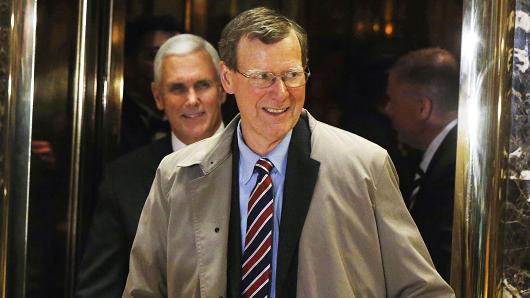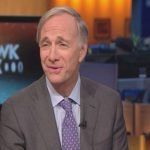American banks likely will have a new chief regulator soon, with one of the most likely candidates a welcome name to Wall Street.
John Allison is a name frequently mentioned when it comes to potential candidates President-elect Donald Trump is considering to run the nation’s financial system, though a handful of other names also have been bandied around.
If the chatter about him is true, Allison would be named for a Federal Reserve Board of Governors vacancy that would make him vice chairman and head of banking regulation, a position left technically unfilled since it was mandated by the Dodd-Frank banking reforms.
The Trump camp did not respond to CNBC requests for comment.
The Street knows Allison well: He was CEO of BB&T from 1989 to 2008 and developed a reputation as a strong hand who guided the bank through years of prosperity and kept the institution off the rocks when the financial crisis hit in 2008. During his tenure, BB&T’s assets swelled from $4.5 billion to $152 billion. The bank now has more than $217 billion in assets and is the 11th-largest U.S. institution.
In addition, he followed up his time there at the libertarian Cato Institute think tank, where he currently serves on the board after being president and CEO from October 2012 to April 2015.
“Having Allison in there, who’s unafraid and unapologetic when it comes to his views on (closing bad banks), would be outstanding.”
Appointing Allison as a Fed governor would carry some irony: A few months ago he told CNBC he would, at least theoretically, like to disband the U.S. central bank, though he knows it’s not “doable in practice.”
“What I really want to do with the Federal Reserve is control it,” he said in late November. “You really have an incredibly powerful organization that there’s no self-discipline for, and it’s had a big impact, I believe, on our economic volatility over the years.”
Allison was unavailable Tuesday for further comment.
He may well get the opportunity to help reshape the Fed, though he also had been in the running for Treasury secretary at one point. The other most serious contenders appear to be Thomas Hoenig, himself a former Fed official and currently vice chair of the FDIC, and John Taylor, the Stanford economist and developer of the oft-cited Taylor rule for where interest rates should be based on economic indicators.
If Trump does tap Allison, they would share neatly matching visions of what the Fed’s role should be. Like Trump, Allison opposes the Dodd-Frank banking reforms. But also like the president-elect, Allison believes in a no-nonsense approach to banks that become systemically dangerous.
“We need to stop putting economists on the board. The reason we have too-big-to-fail is because the economists are afraid to close down bad banks,” said Christopher Whalen, senior managing director and head of research at Kroll Bond Rating Agency and once a rumored candidate himself for the position. “Having Allison in there, who’s unafraid and unapologetic when it comes to his views on this, would be outstanding.”




